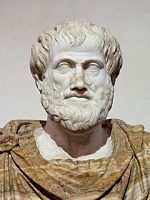34 - Mr. Know It All: Aristotle's Life And Works
Posted on
In this first episode on the most influential philosopher of all time, Peter considers Aristotle’s life and works, and discusses how to go about reading him.
Themes:
Further Reading
• Aristotle, The Complete Works, J. Barnes ed., 2 volumes (Princeton: 1984).
• A New Aristotle Reader, J. Ackrill ed. (Oxford: 1987).
• J. Ackrill, Aristotle the Philosopher (London: 1981).
• J. Barnes (ed.), The Cambridge Companion to Aristotle (Cambridge: 1995).
• J. Barnes, Aristotle (Oxford: 1982).
• J. Lear, Aristotle, the Desire to Understand (Cambridge: 1988).
Stanford Encyclopedia of Philosophy: Aristotle

Aristotle


 ..
..


Comments
Dialogues?
How do they know that he wrote dialogues similar to Plato?
In reply to Dialogues? by ALD
Aristotle's dialogues
Because there are reports in other ancient authors who still had access to the lost "exoteric" works of Aristotle, for instance some of the commentators refer to them (like Simplicius) and I think probably also Diogenes Laertius though I'd have to double-check that.
In reply to Aristotle's dialogues by Peter Adamson
What a find it would be if
What a find it would be if they could come across them. It would be interesting to compare them stylistically with Platos dialogues
The term "Metaphysics"
If I recall correctly, at some point you repeated the assertion that the "Metaphysics" was named such because of being miscellanea that were shelved after the Physics. I always wondered about that story, and I recently found an article refuting it. There's actually a great point of interest in this, apart from the sheer joy of pedantry: apparently Aristotle made a point of saying that the first principles come before the properties of nature in order of emanation, or as seen from the divine realm, whereas from within the human condiction, we need to study nature first before trying to understand what underlies or precedes it. There's a didactic joke in there somewhere involving looking through the wrong end of the telescope ... anyway, the article is Chroust, Anton-Hermann. “The Origin of ‘Metaphysics.’” The Review of Metaphysics, vol. 14, no. 4, 1961, pp. 601–616. www.jstor.org/stable/20123845.
In reply to The term "Metaphysics" by Freeman Presson
"Metaphysics"
Right, there are actually several guesses (just guesses) about where the word "metaphysics" originally came in, probably it just means that one should study this book after the Physics. The main point in any case is that Aristotle doesn't use the word himself. I might have mentioned the "on the shelf" story as a legend just because it is entertaining but I hope I didn't imply that it is a solid fact, I suspect it is actually more like a "just so story." Thanks for the reference by the way, I didn't know that article!
How does philosophy relate to religion?
I've recently discovered your podcast and haven't gotten very far, so this might be brought up in a later podcast. However, I was wondering how philosophical arguments brought up so far relate to religious beliefs at the time? For example, changing forms (reincarnation) was mentioned. Did the philosophers' piggyback off of Hindu or other religious' ideas or was it just a coincidence how they coincide together?
In reply to How does philosophy relate to religion? by Megan
Philosophy and religion
That is a big and important question, but I think there is no one answer because different philosophers think about religion in different ways; often they are trying to support the religious beliefs of their culture through rational argumentation. I have a discussion of this under "frequently asked questions", it's the last question; and you can also check out the episodes on the relevant them, religion and reason.
Transcrript
I thought I could download a transcript of videos here?
In reply to Transcrript by Olamide
Transcripts
This is actually covered under Frequently Asked Questions (FAQ) below, if you click on the link there. Short version: for many of the episodes there are already book versions, which is in effect how I release them as transcripts, but better because there is additional annotation and other added material.
We must honor the truth above our friends
I am glad you are encouraging us to read these works of Plato and Aristotle again. It is like reading Homer. No matter how many times one reads these poems ( and I have done these many times in my career), one always finds something new that was missed before. Same here. Aristotle's line in the Nichomachean Ethics that we must honor the truth above our friends sounds very similar to Socrates' admonition with regard to Homer in the Republic 10. 595c that a man should not be honoured more than the truth.
Marx
Marx is also great and one of the most abused philosophers.
In reply to Marx by Great Philosopher
Marx
Oh yes, no doubt. But I think it is pretty preposterous to suggest he might have been the greatest philosopher of all time. Then again, the question is also preposterous so maybe it is the kind of answer that question deserves.
In reply to Marx by Peter Adamson
MARX
You're probably bourgeois or come from a bourgeois family that lives off of the surplus value of other people's labor, which is why you find the idea that Marx is the greatest so preposterous. The philosophers have only interpreted the world. The point is to change it.
Your contempt for the working class was evident in your snarky little "yeah, I know."
In reply to MARX by A Worker Who Reads
Marx
Actually I think Marx is super interesting, and will certainly give him extensive and sympathetic treatment if I manage to get that far chronologically. I just think the idea that he is the greatest philosopher who has ever lived is patently absurd; the "yeah I know" had nothing to do with class (except insofar as everything has to do with class, as Marx taught us) and was a joke premised on the expectation that audience members would agree.
If I had to give a reasoned objection, I might start by saying that Marx is surely among the most important economic and political thinkers (maybe top five? along with Aristotle, actually!), and these are key areas of philosophy; but reducing philosophy to only these areas is reductive and wrong. Actually your claim there makes the point that I disagree with. To my mind philosophy is not only valuable when it changes the world. If that were true we should be spending a lot less time on metaphysics and epistemology.
Though now I'm questioning my own response because Marx did have an original metaphysics and epistemology too, albeit that these were arguably in service of his political thought.
But overall, the idea of naming just one greatest philosopher is absurd anyway, so I think one shouldn't get too worked up about it.
In reply to Marx by Peter Adamson
You are right.
You are right.
Peter Adamson
Peter Adamson's podcast is a flowing river of gold.
Add new comment